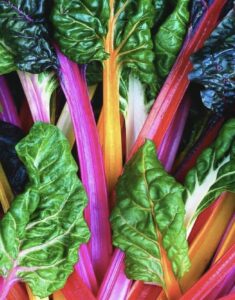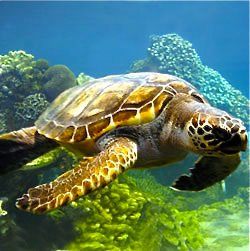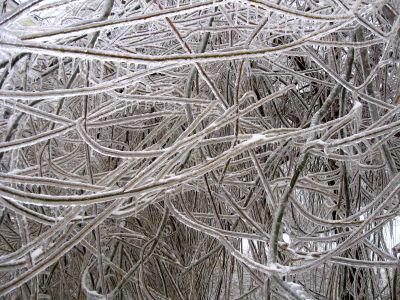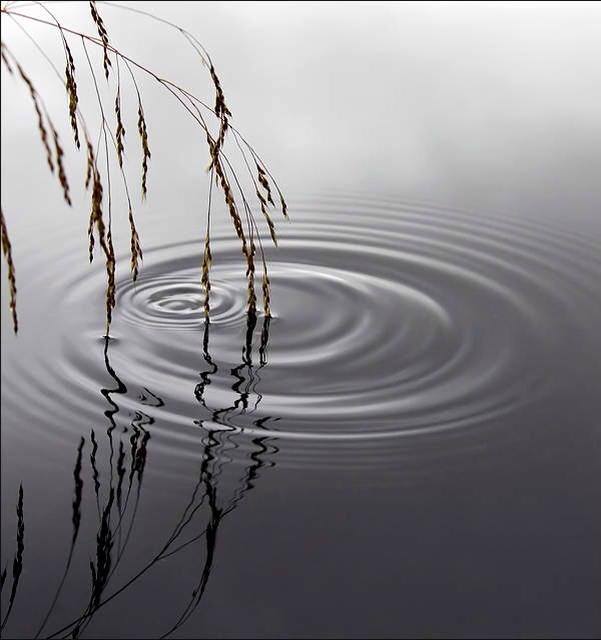Extrapolations of the Su Wen
Chapter 2
On conforming with the
Energy of the Seasons
Extrapolations of the Su Wen
Chapter 2
On conforming with the
Energy of the Seasons
According to traditional Chinese dietary practice, foods should aid in balancing and contributing to the health of the person, and what that requires varies throughout the seasonal shifts of the year. The daily diet in summertime should rely more on vegetables and fruits than in other seasons to stimulate the appetite, which can become sluggish due to seasonal heat and humidity. Due to environmental heat and subsequent loss of fluids through sweating, Yin fluids of the body can become depleted, leading to dehydration and taxation. Seasonal fruits and vegetables help to replenish Yin fluids, which in turn, keep the body temperature cooler. In the summertime, Qi and Blood move more vigorously than at other times of the year. Such physiological changes contribute to overfunctioning of the Heart, with the potential for Yang Qi to flow excessively to the exterior of the body.
 According to the five-element theory, an over-functioning of Fire [Heart] restricts the functioning of Metal [Lung], and so it is advisable to eat a complement of moderately pungent flavor of corriander, chive, parsley, and the like; while reducing foods and drinks of a bitter taste including hops beverages, vinegar (both sour and bitter), coffee, and the like, because bitter is the flavor of the Fire element, and exherts control over the Metal element. The Lung maintains normal sweating, essential during the heat of summertime, to regulate inner heat and fluid moisture. Sweat is the humor of the Heart, and excessive sweating ‘scatters’ the Qi of the Heart, weakening the mind and causing symptoms such as restlessness, vexation, lackluster, and difficulty sleeping. So, the Heart should be in balance to maintain homeostasis, especially during the summer months.
According to the five-element theory, an over-functioning of Fire [Heart] restricts the functioning of Metal [Lung], and so it is advisable to eat a complement of moderately pungent flavor of corriander, chive, parsley, and the like; while reducing foods and drinks of a bitter taste including hops beverages, vinegar (both sour and bitter), coffee, and the like, because bitter is the flavor of the Fire element, and exherts control over the Metal element. The Lung maintains normal sweating, essential during the heat of summertime, to regulate inner heat and fluid moisture. Sweat is the humor of the Heart, and excessive sweating ‘scatters’ the Qi of the Heart, weakening the mind and causing symptoms such as restlessness, vexation, lackluster, and difficulty sleeping. So, the Heart should be in balance to maintain homeostasis, especially during the summer months.
Yin: During summertime, the most Yang time of the year, Chinese medicine emphasizes mostly Yin foods in the daily diet, which are foods that naturally ripen to fruition in the brightness of the Yang growing months, and counteract the excesses of the summer season. Generally, vegetables have the overall tendency of Yin, and contain inherent moistening, Yin energy.
Preparation: Cooking methods affect the energy that is contained within food. In summertime, steaming is favored as it enhances Yin. A person who is Yin deficient benefits from eating foods that are steam-cooked throughout the seasons.
Summer foods that cool and accentuate Yin: Fresh bamboo shoots, lotus root, water chestnuts, tofu, soy beans and mung beans, cucumber, celery, string beans, bitter melon, watermelon, strawberries, plums, peaches, jicama, bok choy, enoki mushrooms, spinach, lettuce, radish, cantaloupe, peppermint, aloe vera, wild rice, aromatic herbs, green and herbal teas with mint added, and chrysanthemum tea. To name a variety.
Avoid iced drinks and desserts, and an abundance of chilled foods, in general.
The tendencies and symptoms that an individual develops are consistent with their constitution and way of life, and therefore, there is no one-size-fits-all diet. The basic outline drawn here lends a sense of how foods are utilized for their flavors and properties that have respective effects on the organs and humors, differentiated from season to season, and highlighting summer. Chinese medicine has long taught that acupuncture points, herbal medicines, and foods are to be utilized seasonally, integral in keeping the individual in balance and harmony with nature and universal flow. This overview is not intended to advise or manage any illness.
Well-Wishes to You · Please Enjoy & Share

✍️Wendy Brown, Lic. Ac.
As a microcosm of the rhythms and fluctuations of the seasons and their elemental factors to which we are inextricably linked, Chinese medicine would consider the result of our health in one season as being a marker of our lifestyle preparations in the previous seasons as well as in the present. With regard to colds and flus, the ability of the immune system to resist external pathogens, be they bacterial, viral, or allergen toxins that result in immune suppression that leaves us ailing and struggling to recover, exists in the strength of ‘Wei Qi.’

A patient texted me asking how my flu kung fu is: i.e. my thoughts on flu shots. I put together the following from the TCM perspective to share in response. Collage by W.Brown, Lic. Ac.
In Chinese medical theory, Wei Qi is fierce, useful, combative energy from nutrition, says the Lingshu, a medical text compiled in the 1st century BCE, one of two parts of a larger work known as the Huangdi Neijing, the Yellow Emporer’s Divine Classic. Wei Qi is lively and agitated and circulates in superficial tissues, skin, connective tissue, muscles and peritoneum. It radiates to the chest and abdomen. According to the classics, it does not circulate through the meridians but rather flows through the face, trunk, and limbs during the day, and at night through the viscera. Wei Qi protects the body from external perverse energies by opening and closing pores and warming connective tissues. It concentrates at the sites of acupuncture points, the “Holes of Qi,” per se. Wei Qi represents the whole immune system, from leukocytes to anti-bodies, histamine, bradykinin and serotonin.
In Chinese medicine it is an intrinsic reference to discuss “wind gates” and “wind invasion or wind penetration.” The neck, sides of the head, forehead, and upper back according to TCM are conduits whereby externally contracted pathogenic wind can gain entry to the body. Fierce Wei Qi is the primary way the body resists an invasion. Nutritional status, inadequate rest, excessive consumption of alcohol, among other lifestyle factors may lead to the impairment of Wei Qi. It is always advisable to adequately keep wind gates covered, interestingly, in every season to varying degrees. The migration of wind inside the superficial levels of the body can lead to cold and flu symptoms exhibited as chills, body aches, headache, runny nose, congestion, cough and fever. Vulnerability in externally contracting wind is increased by damp hair. We are far more empowered than we may realize in the ways to govern our health and be master of our own unfolding. The timeless ways of Traditional Chinese medicine can be an invaluable guide to reeducating our modern misconceptions and to show us the way.
![]()
Further reading on Wind
With all best wishes for a healthy cold weather season!
Until the Song dynasty [960-1279 AD] the Chinese name for Ginkgo was ‘duck foot’ 鴨腳, referring to the shape of its leaves. The kernel was called ‘duck foot seed’ 鴨腳子, which was changed to ‘Silver Apricot’ 銀杏 for the purpose of its presentation to the Imperial ruler. It was determined that ‘Silver’ was auspicious and that ‘Duck Foot’ was not. During the Ming period [1368-1644] the term for the shell-like sclerotesta and inner parts was ‘Silver Fruit’ 銀果 or Yin Guo, and White Fruit 白果, Bai Guo, which remains Ginkgo’s name in China and in Chinese medicine today.

Gingko Seeds • Photo© Wendy Brown
Pictured, are a few fetid-smelling, squishy, picture-perfect Ginkgo berries I collected from a female tree during the second week of December of 2014. The nuts have a slightly poisonous quality and thus, should not be taken in large quantities or for prolonged periods of time. The medicinal nature of Bai Guo astringes, stabilizes and binds, treating Lung and Kidney with sweet, bitter, astringent, and neutral properties. In Chinese medicine, Ginkgo is helpful in nourishing cognitive and nervous system disorders, while calming Shen and nourishing Jing.
![]()
Wellness and Best Wishes to All
The way of great learning lies in illuminating bright virtue;
Holding people dear and stopping only at utmost goodness.

©Wendy Brown, Lic. Ac. – All image rights reserved.
To illuminate brightest virtue under Heaven, ancients governed their states first. To govern their states, they first put their families in order. To put their families in order, they first cultivated their body. To cultivate their body, they first rectified their Heart. To rectify their Heart, they first made their intentions sincere.
From: Sìshū Wŭ Chīng 四書五經
The Four Books, written before 300 BC
大學之道在明明德,在親民,在止於至善 • 知止而后有定;定而后能靜 • 靜而后能安;安而后能慮;慮而后能得 • 物有本末,事有終始,知所先後,則近道矣。• 古之欲明明德於天下者,先治其國 • 欲治其國者,先齊其家 • 欲齊其家者,先修其身 • 欲修其身者,先正其心 • 欲正其心者,先誠其意 • 欲誠其意者,先致其知 • 致知在格物 • 物格而後知至 • 知至而後意誠 • 意誠而後心正 • 心正而後身修 • 身修而後家齊 • 家齊而後國治 • 國治而後天下平 • 自天子以至於庶人,壹是皆以修身為本 • 其本亂而末治者, 否矣 • 其所厚者薄,而其所薄者厚,未之有也
![]()
A few thoughts ✍️Wendy Brown, Lic. Ac.
The human world aspires to feel no pain on its illusory quest for security and gratification; starkly contrasting the experience of anyone living in states of pain and suffering. In the midst of day-to-day objectives, the plight of sentient beings trapped in states of suffering often completely escapes our consideration. Suffering is an ageless aspect of life; perception, though it is, it is convincing, and nonetheless brutal to observe and more-so to endure. Sickness, torment, and intense pain may arise and persist, leading to isolation. Beings who are suffering are often unseen, not understood, tip-toe’d around, swept aside, or given up on. In their isolation, we are unlikely to encounter them unless we, ourselves, are in fields that provide care, are working in professions of animal rescue or slaughter, a loved one has fallen deeply ill, and such relationships to the condition of beings.
No matter where you are, and whatever your personal affiliations may be, there are ways to offer the tribute of your solidarity with fellow beings that we share existence with, many of whom suffer the very moments of their life greatly. Compassionate awareness is an illuminating quality that generates the context of past, present, and future; for ourself, and for all that we can and cannot conceive of. Comtemplate aspirations throughout the day for the well-being of an individual, combined to include all beings in states of fear, loneliness, pain, hopelessness, depression, confusion, desperation, and despair at this very moment.
In a more material approach, we can find the opportunity to visit our sick friend or acquaintance with some groceries, visit and offer comfort and enrichment to animals at a shelter, cook a meal for someone who you know is lonely or new to the area, simply give someone a smile, kind word and supportive gesture, for example.

May All Be Happy and Free From Harm
May Our Wisdom and Compassion
Bring Comfort to Existence
✍️Wendy Brown
When the sage embraces
the divine sovereign heart
her voice can move
and transform the world
•
One who lacks purity and
sincerity cannot move others
•
When a person merges
with this truth in essence,
the shen-spirit may move
amongst the external world
with highest degree of sincerity
•
One who forces himself to
lament, though may sound
sad, will awaken no grief
•
One who forces himself to
be angry, though may sound
fierce, will arouse no awe
•
She who forces herself to
be affectionate, though may smile,
will create no air of harmony
•
True sadness need make
no sound to awaken grief
•
True anger need not
show itself to arouse awe
•
True affection need not
smile to create harmony
•
Truth and sincerity are
to be prized as a doctor
of Chinese medicine
•
People come from far
and wide for help
True healing is derived
from principles of
sincerity, truth, and purity
•
This intrinsic disposition
is what makes it so that
a patient listens to, and
hears, the practitioner
•
Humans loathe death
and delight in life.
A doctor of Chinese medicine
informs what in a patient’s
life can destroy them;
Tells them what can
be good for them;
Advises what is convenient
for their condition;
Exposes what brings them suffering
•
Even if they are the kind
of person who does not
follow The Way (Tao),
being without principles,
or does not follow the
patterns of the natural
order of life, how would
they not listen to the
doctor who is sincere
and pure in this medicine?
•
Lingshu Chapter 29

✍️Wendy Brown, Lic. Ac.
Shuǐ 水
We are microcosms of the natural world, unfolding our human destiny on a beautiful blue planet where a mosaic of water nourishes and patterns life.
 Attuned to nature’s rhythms and vibrations, in essence, we are one and the same.
Attuned to nature’s rhythms and vibrations, in essence, we are one and the same.
 Though this world seems stable and solid, nothing here is permanent; but like water, snow, and ice, life is always shifting and taking form.
Though this world seems stable and solid, nothing here is permanent; but like water, snow, and ice, life is always shifting and taking form.


 Winter is the time of energy storage and of hibernation. Through resonance of water in its contracted state, very subtle patterns can emerge to be sensed in this phase of inward vision.
Winter is the time of energy storage and of hibernation. Through resonance of water in its contracted state, very subtle patterns can emerge to be sensed in this phase of inward vision.
 Ever-remembering that in a great storm the wise bird returns to her nest and waits patiently, surrendering to winter’s depths. Nature’s icy retreat instills hibernation and inner reflection.
Ever-remembering that in a great storm the wise bird returns to her nest and waits patiently, surrendering to winter’s depths. Nature’s icy retreat instills hibernation and inner reflection.
 The water element is expressed in the season of winter which carries information of recharging and renewing.
The water element is expressed in the season of winter which carries information of recharging and renewing.
 Reverently entering nature and observing the flow of streams, rivers, and waterfalls is, in itself, one of the natural remedies for a troubled mind. Water benefits the ten thousand things and yet does not compete with them. Water dwells in places the masses of people detest. People detest such places not because they are bad, but because they are unfamiliar; they are held back by fear of the unknown or thrust forward in fearful arrogance, in either manner not trusting in the Tao.
Reverently entering nature and observing the flow of streams, rivers, and waterfalls is, in itself, one of the natural remedies for a troubled mind. Water benefits the ten thousand things and yet does not compete with them. Water dwells in places the masses of people detest. People detest such places not because they are bad, but because they are unfamiliar; they are held back by fear of the unknown or thrust forward in fearful arrogance, in either manner not trusting in the Tao.

The emotion of fear ultimately causes difficulties. Learning to move gracefully around obstacles, like water does, is one of the aims of T’ai Chi.

The flow of Tao, wherever it may go, leads one to unusual places, but places meant to be visited by those who have devoted themselves to the Way.
 Life is a dream and we can dream new dreams.
Life is a dream and we can dream new dreams.

May all beneficent aspirations be fulfilled

✍️Wendy Brown, Lic. Ac.
ACUPUNCTURE DETOX
Approach to Breaking Chemical Addiction
Abstinence-Oriented
Chemical-Free
No-Nonsense
Treatment begins with the patient lying down, as during a regular acupuncture session. Alternately, a group gathers, where individuals are seated in chairs to undergo acu-detox treatment in the presence of one another. Groups are offered at a significantly reduced cost. A peaceful treatment atmosphere can be expected in both individual and group settings. The Acu-Detox treatment is based on the insertion of fine gauge, sterile acupuncture needles into the 5 detox points of each ear, for up to 40 minutes. The 5 detox points have been shown to effectively address the major organs of the body and brain chemistry that are negatively impacted by the effects of substance usage. The points relate to the lungs, kidneys, liver, sympathetic nervous system, and ‘Spirit’s Gate’, an acupuncture point that stimulates the harmonizing of Heart-Spirit, reducing mental-emotional and physical pain, and reducing effects of craving. The treatment affects the organs and bodily functions that cleanse and balance the body and support overall well-being. Chinese herbs are additionally offered to promote supportive results between Acu-Detox sessions.

Asheville Citizen-Times, January 1995, Acupuncture-Detox article featuring Wendy Brown, Lic. Ac. performing treatment
Start your new, healthy flow. This is a program that works! The nature of addiction is insidious and people need to know there is a successful path available. Please share & contact for an appointment: (828)281-4330